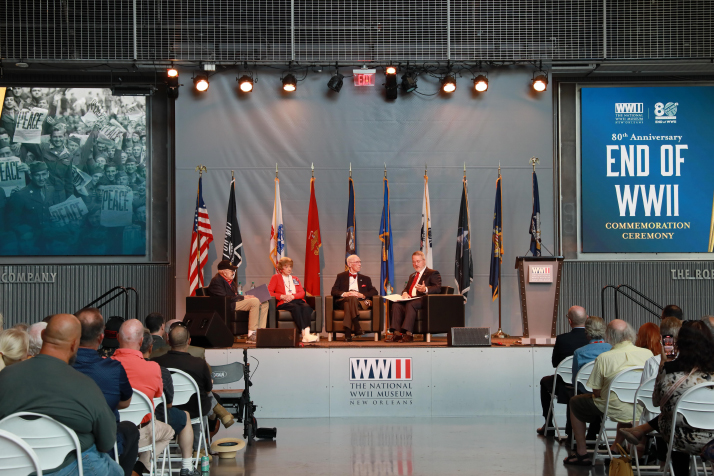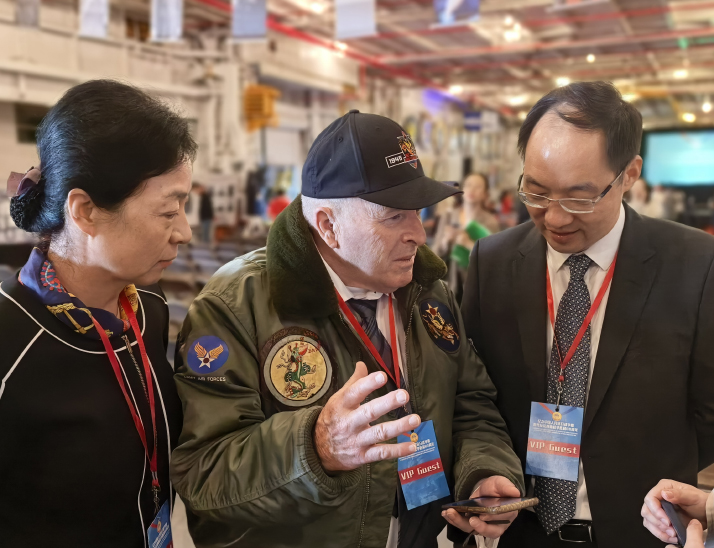| World |
| Honoring a shared WWII victory enhances mutual understanding between Chinese and American people | |
|
|
 The National WWII Museum of the U.S. holds an event commemorating the 80th anniversary of the war's end in New Orleans, Louisiana, the U.S., on August 14 (XINHUA)
On the hangar deck of the historic aircraft carrier USS Hornet, now serving as a floating museum in Alameda, California, beneath steel trusses and surrounded by aircraft once famed for their roles in World War II (WWII) battles, diplomats, historians, veterans and community representatives from China and the United States gathered on August 30 to commemorate the 80th anniversary of the victory in the Chinese People's War of Resistance Against Japanese Aggression and the World Anti-Fascist War. More than 400 attendees moved between exhibits and a central stage, where speakers honored shared sacrifice and called for renewed practical cooperation. A ceremonial handover of wartime archives, donated by overseas Chinese to Sun Yat-sen University in Guangzhou, capital of Guangdong Province in south China, underscored the event's forward-looking message: preserving memory to inspire future generations. Framing the moment The event was co-hosted by the USS Hornet Sea, Air and Space Museum, the Atlanta-based Carter Center and the Museum of the War of the Chinese People's Resistance Against Japanese Aggression in Beijing. Keynote addresses, historical exhibits and personal testimonies traced the arc from wartime cooperation to modern-day responsibilities under the United Nations Charter. Speakers emphasized that the cooperation between China and the United States during WWII is a living resource for easing tensions in bilateral ties and strengthening people-to-people ties today. In a video address, Chinese Ambassador to the U.S. Xie Feng tied remembrance to present-day obligations. "Eighty years ago, the Chinese people, together with the American people and all forces for justice around the world, completely defeated the fascist powers with unbreakable will and heroic resistance," he said. "Memories of history will not fade with the passage of time, and the great truth resounds even more strongly today, that justice will prevail, peace will prevail, and the people will prevail." Zhang Jianmin, Chinese Consul General in San Francisco, said at the event, "China was the first to resist fascist aggression and the last to end fighting, suffering more than 35 million casualties." Citing Chinese villagers who sheltered U.S. airmen after the Doolittle Raid in April 1942, Zhang pointed out that wartime solidarity extended beyond formal alliances. "When the international community stands united, there is no evil that cannot be defeated and no peace that cannot be defended," he added. On April 18, 1942, a group of 16 U.S. B-25 bombers, led by Lieutenant Colonel James Doolittle, took off from the USS Hornet and raided Japanese cities, including Tokyo, in retaliation for the attack on Pearl Harbor. After the strike, 15 of the bombers crashed into the sea and the mountainous areas of China's Jiangxi, Zhejiang, Anhui and Fujian provinces. Of the 75 airmen aboard the planes, 64 were rescued by the Chinese people, mostly villagers who had received no official notice the planes had crashed. Sustaining memory Laura Fies, Executive Director of the USS Hornet museum, framed the museum as a living classroom. "Let us remember the past, celebrate the present and inspire the future," Fies said at the event, pointing to the day's turnout as proof that partnerships between museums, schools and diaspora communities can expand impact without compromising accuracy. Yu Yunquan, Vice President of China International Communications Group, echoed Fies, emphasizing the need to broaden access to wartime materials and scholarly research results. Through multilingual publications, joint programs and academic exchange, Yu said, institutions can turn archival records into shared narratives. "We look forward to working hand in hand with peace-loving organizations in the United States to build a more stable and prosperous world together," he said, emphasizing that cultural and communication collaboration serves as a defense against the denial and distortion of history.  Yu Yunquan (right), Vice President of China International Communications Group (CICG), and Li Yafang (left), Associate Editor in Chief of CICG, talk with Clifford Long Jr., son of a member of the Flying Tigers, at an event commemorating the 80th anniversary of the victory in the Chinese People's War of Resistance Against Japanese Aggression and the World Anti-Fascist War at the USS Hornet Sea, Air and Space Museum in Alameda, California, the U.S., on August 30 (COURTESY PHOTO)
Jeffrey Greene, Chairman of the Sino-American Aviation Heritage Foundation, recalled the heroic flights and the rescue of U.S. airmen by Chinese people that defined the legacy of the American Volunteer Group (AVG) and subsequent U.S. Army Air Forces operations in China. The AVG, popularly known as the Flying Tigers in China, was a U.S. air squadron composed of pilots from the U.S. Army Air Forces, Navy and Marine Corps, which helped the Chinese fight the Japanese invaders during WWII. "What makes this story unique is that whenever American airmen were forced down, they were nearly always saved by Chinese villagers, who knew that discovery meant death for themselves and their families," he said. "This was more than alliance, it was humanity in its purest form." Greene urged younger participants to translate reverence into action through study, exchange and service. John Easterbrook, grandson of U.S. General Joseph Stilwell, who served as commander in chief of the U.S. armed forces in the China-Burma-India Theater during WWII, sketched a family line threaded through wartime Chongqing in southwest China to present-day California. He cited the Stilwell Museum in Chongqing, a scholarship in California for Chinese students and the 2011 National Memories photo exhibition that showcased U.S. wartime assistance to China. "My grandfather's respect for the Chinese people has been passed down through five generations," Easterbrook said. Centenarian Chinese veterans Li Yurong and Lin Huajian attended the ceremony, representing a generation that bore the direct toll of the war. Their presence, alongside families of Flying Tigers veterans—highlighted the event's commitment to passing down the wartime spirit of friendship and cooperation between the two countries. "People of our two countries should stay undaunted by the headwinds of 'political correctness,' dispel the gloom of the 'chilling effect' and foster greater warmth through reaching out to and connecting hearts with each other," Xie said. Looking ahead If the throughline of the day was sacrifice, the refrain was responsibility. Greene distilled the point in a closing reflection: "Even in humanity's darkest hours, people can choose loyalty over fear, and compassion over self-preservation. Peace is built when nations look beyond borders and walk together with hope." Eighty years after victory in the war against fascism, participants aboard the USS Hornet argued that honoring the dead requires hard work among the living. "History is a mirror, helping us observe the present," Xie said. "Eight decades ago, China and the U.S. fought side by side against fascist aggression. Today, as the world's two largest economies and permanent members of the UN Security Council, our two countries share a special and significant responsibility for world peace, stability and prosperity, and should all the more demonstrate the vision and play our role as major countries." On the hangar deck, that proposition read more like a plan, one that begins with archives and exhibitions, and continues with young generations who will carry the story forward. (Print Edition Title: Safeguarding History, Shaping the Future) Copyedited by Elsbeth van Paridon Comments to zhaowei@cicgamericas.com |
|
||
|
||||||||||||||||||||||||||||
|